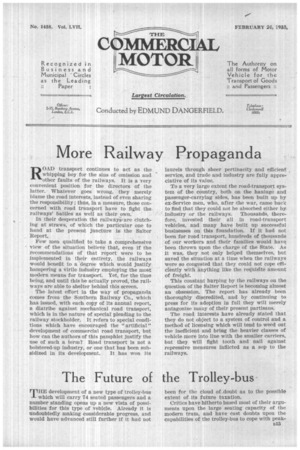More Railway Propaganda
Page 29

If you've noticed an error in this article please click here to report it so we can fix it.
R0.6iD transport continues t6 act as the whipping boy for the sins of omission and other faults of the railways. It is a very convenient position for the directors of the latter. Whatever goes wrong, they merely blame the road interests, instead of even sharing the responsibility ; thus, In a measure, those concerned with road transport have to light the railways' battles as well as their own.
In their desperation the railway areclutching at straws, of which the particular one to hand at the present juncture is the Salter Report.
Few men qualified to take a comprehensive view of the situation believe that, even if the recommendations of that report were to be implemented in their entirety, the railways would benefit to a degree which would justify hampering a virile industry employing the most modern means for transport. Yet, for the time being, and until this be actually proved, the railways are able to shelter behind this screen.
The latest effort in the way of propaganda comes from the Southern Railway Co., which has issued, with each copy of its annual report, a diatribe against mechanical road transport, which is in the nature of special pleading to the railway stockholder. It refers to special conditions which have encouraged the "artificial" development of commercial road transport, but how can the authors of this pamphlet justify the use of such a ferm? Road transport is not a bolstered-up industry, or one that has been sub sidized in its development. It has won its laurels through sheer pertinacity and efficient , service, and trade and industry are fully appreciative of its value.
To a very large extent the road-transport system of the country, both on the haulage and passenger-carrying sides, has been built up by ex-Service men, who, after the war, came back to find that they could not be absorbed either by industry or the railways. Thousands, therefore, invested their all in road-transport vehicles, and many have built up successful businesses on tNs foundation. If it had not been for road transport, hundreds of thousands of our workers and their families would have been thrown upon the charge of the State. As it was, they not only helped themselves, but saved the situation at a time when the railways were so congested that they could not cope efficiently with anything like the requisite amount of freight.
This constant harping by the railways on the question of the Salter Report is becoming almost an obsession. The report has already been thoroughly discredited, and by continuing to press for its adoption in full they will merely antagonize many of their present partisans.
The road interests have already stated that they do not object to a system of control and a method of licensing which will tend to weed out the inefficient and bring the heavier classes of vehicle more into line with the smaller carriers, but they will fight tooth and nail against repressive measures inflicted as a sop to the railways.




























































































